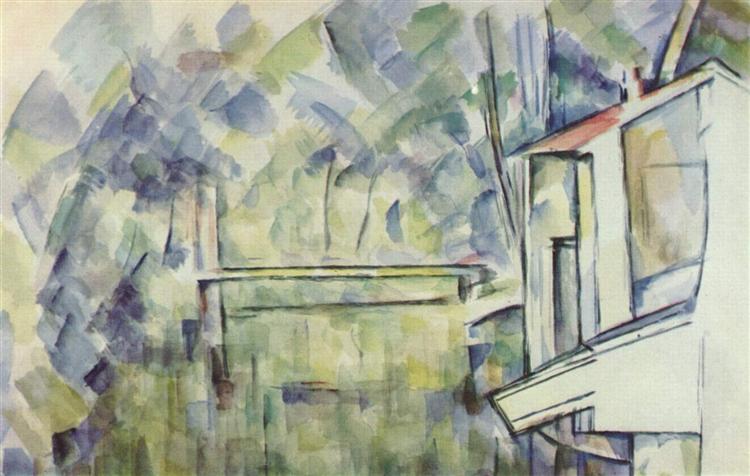Opis
Paul Cézanne's "Mill on the River", painted in 1906, stands as a fascinating testament to the artist's artistic evolution and a poignant exploration of landscape as a means of expression. Cézanne, one of the fathers of Post-Impressionism, maintains his essence in this painting by integrating nature and form through his distinctive use of colour and composition.
In this piece, the viewer is presented with a pastoral scene evoking an idyllic serenity, a landscape characteristic of the French countryside. In the centre, a windmill stands in an almost monolithic arrangement, anchored firmly to the ground and framed by a natural setting that includes the flow of the river and lush vegetation. The choice of the windmill structure as a focal point reflects Cézanne's interest in geometric forms, a recurring theme in his work, where the organic meets the built, suggesting a harmony between man and nature.
The color palette in “Mill on the River” is notable for its restraint and subtlety. Cézanne uses a range of earthy greens and muted blues that instill a sense of depth and atmosphere, while hints of yellow suggest light filtering through leaves. This choice not only reflects the light of a calm afternoon, but also captures the vibrations of a living landscape, in tune with the spirit of the moment. Cézanne’s brush technique, characterized by the application of small brush strokes, creates a texture that invites the viewer to enter the work and feel the three-dimensionality of the scene.
Although there are no visible characters in this setting, the absence of human figures is intriguing, suggesting the serenity and isolation of rural life. The mill, a symbol of human labour, inhabits an almost mystical setting that seems to transcend time, allowing for a silent dialogue between nature and culture. This choice to strip the painting of human figures can be interpreted as reinforcing the emphasis on landscape and architecture, where the viewer becomes the only visitor.
Examining works like “Mill on the River” allows one to revere not only Cézanne’s unique style, but also the impact he had on the development of modern art. His explorations with perspective, form, and color laid the groundwork for movements that would follow, from Cubism to Fauvism. This work is, at its core, a combination of observation of the natural world and the principle of transformation, where each brushstroke is a declaration of love for the simplicity and complexity that coexist in the landscape.
In the history of painting, Cézanne's "Mill on the River" stands as a bridge between tradition and innovation, a canvas that stands out not only for its formal beauty but also for the narrative it suggests. The work invites us to consider the dialogue between man and his environment, a theme that remains relevant in contemporary times. Thus, Cézanne becomes not only a chronicler of his time, but a visionary who challenges us to reevaluate our perception of the landscape and life itself.
KUADROS ©, a famous painting on your wall.
Hand-made oil painting reproductions, with the quality of professional artists and the distinctive seal of KUADROS ©.
Painting reproduction service with satisfaction guarantee. If you are not completely satisfied with the replica of your painting, we will refund 100% of your money.

